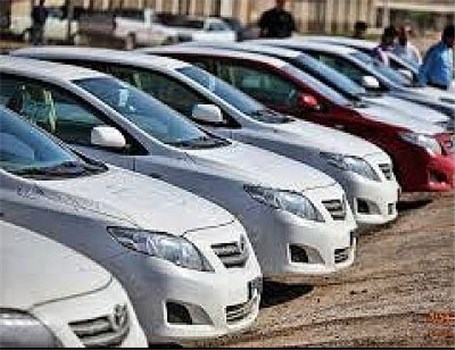
- Friday 31 July 2015 - 18:20:00
Azerbaijan not impressed by car opportunities of Iran
Asre Khodro:The markets in Iran are changing rapidly and neighboring friendly country Azerbaijan has been watching these changes closely.
Reporting "Asre Khodro",The lifting of sanctions imposed by the UN Security Council, the United States, and the European Union, earlier on Iran, raises questions on the consequences for the world economy and international economic relations.
To date, German car manufacturer Mercedes-Benz plans to buy 30 percent of the Iranian Diesel Engine Manufacturing Company based in Tabriz.
Iran and Mercedes-Benz will also sign an agreement for a period of 10 years for the production of trucks and buses in Iran, Iran Khodro Managing Director Hashem Yeke Zare told Trend. No wonder, since before Western sanctions, Mercedes-Benz had been a major partner for Iran.
Moreover, Mercedes-Benz intends to acquire a 50 percent stake in the Iranian car manufacturer Setar-Iran and sign a five-year agreement on the production of passenger sedans.
Following Mercedes-Benz, the German automotive concern Volkswagen could also become a reliable partner for Iran. German Daimler AG, a producer of luxury cars, could also sign an agreement with Iran Khodro in the next three-four months, Zare said.
The French Peugeot intends to establish a joint venture with Iran to produce cars, 30 percent of which will be exported, he added. Major automakers like the French Renault and the Japanese Suzuki also expressed willingness to return to Iran.
This situation will inevitably impact the car market of neighboring Azerbaijan, which switched to the Euro 4 ecological standard in April 2014.
The Euro 4 standard forbids the import of cars manufactured prior to 2005 from the EU, 2004 in the U.S., 2011 in China and Japan, 2006 in Korea, and 2009 in Turkey.
Azerbaijan with a population of 9.6 million is now saturated with over 1.2 million cars, and in 10 years, the number of cars is expected to reach 3 million. Such a large number of vehicles negatively affect the environment, which is why Azerbaijan switched to Euro 4 bypassing the Euro 3 standard.
Today, only newly produced cars can be imported to Azerbaijan, which decreased its total imports by about 40 percent in 2014.
This year, so far 17,640 cars were imported in Azerbaijan; that figure was 34,359 for the first half of last year. The number speaks for itself, showing the efficiency of the Euro 4 standard.
Thus those in Azerbaijan with concerns over older cars being imported from Iran need not worry. According to the Euro 4 standard, Azerbaijan can import cars from Iran produced no later than 2009.
Azerbaijani car market not thrilled by the news
Expert economist Oktay Hagverdiyev told AzerNews that the situation could affect Azerbaijan, but only slightly, as cooperation between two countries is mainly focused on energy.
“Azerbaijan did not buy cars from Iran. Even if Mercedes-Benz and Volkswagen start manufacture in Iran, Azerbaijanis will prefer cars produced in Russia, for instance,” he believes.
Hagverdiyev went on to explain, “All these companies were presented in Iran before, but it was not observed obviously, the production was aimed at the internal market of Iran.”
“Now companies are thinking before returning to the Iranian market, which can be filled in a year or two, and then the production will fall sharply, and a loss of investment is evident,” he added.
Customers in Azerbaijan are quite scrupulous in choosing a car, its quality and country of manufacture, especially when it comes to expensive models.
As new production in Iran is not expected to change the car market, the obvious change in price is also not an issue.
Azerbaijan imports cars mostly from Georgia, however, after the transition to Euro 4, imports declined. Some 2,207 cars worth $41.4 million were exported from Georgia to Azerbaijan in January-June 2015. This is 5.4 times less than in the same period of 2014, the Georgian National Statistics Service said.
Iran seeks to produce cars in Azerbaijan
In the meantime, Iran plans to produce its cars in Azerbaijan. Iran Khodro is negotiating with the Azerbaijani side to build a car assembly plant in Azerbaijan, IKCO Managing Director Hashem Yeke Zare told Trend.
The plant will be built using an Azerbaijani businessman’s investments, and the production will start roughly two years after obtaining the license.
Today, Iran Khodro exports cars to Azerbaijan and Zare claims that Iran plans to export 2,000 cars to Azerbaijan this year.
The company also plans to manufacture 10,000 cars per year in Azerbaijan, which will be exported.
Currently, two plants manufacturing vehicles – Nakhchivan and Ganja automobile plants – operate in Azerbaijan.
Overall, last year was marked by a decrease in car imports and a car production increase in Azerbaijan.
At present, it seems that Iranian car production in Azerbaijan may be more effective to the economy of our country, while car production in Iran is not expected to affect the car market of Azerbaijan.
Source:Azer News
- Iran automotive market
Sout Korea’s auto exports down 1.6% in Feb.
Renault to Return to Iran: Deputy Minister
Renault to stay in Iran despite US sanctions
M&M plans SUV foray into Iran
Automotive Industry in Iran, a short review
Automakers are forced to implement new car standards
Removing some price ranges from the car market
Renault Lead the Way, Nissan Climb
An End to Car Importing Suspension
The Renault partnership in Russia changes the investment location in Iran
No Cherry-Picking, All Low-Quality Cars Have to Go
Details of new rules for importing car to Iran
European carmakers on the road back to Iran after nuclear deal
Renault has reached to the top market for imported cars in Iran
Iran is the place for peugeot to jump the platform
What Future for Iran Car Market?
France’s Peugeot, Total Looking for Stronger Presence in Iran
French Leverage in Iran Auto Industry
Iran Carmakers Obliged to Offer 2-Year Guarantees
Over 13 million cars in use in Iran
Renault Imports to Iran Increase 110%
VW's Seat considers selling cars in Iran - CEO
Iran to Finalize Deal with Renault in Weeks: Minister
Iran Khodro Group Retains 39% Market Share
Iran stars as Renault powers to record 2016 sales
Renault Duster May Be Obsolete
VW to made CNG cars for Iran
Iran has potential to be top-10 auto market by 2020
Renault Sales in Iran Up by 127% in September
Volkswagen and Skoda look into Iran market entry
Renault Looks to Grow Automotive Presence in Iran
Iran’s Car Market: Heading High or Low?
Peugeot targets 150,000 vehicle sales in Iran in second half
A positive political environment has helped Iran’s car market
Peugeot to try for making Iran its manufacturing hub in Middle East, Africa
Germany’s Bavaria to dispatch trade delegation to Iran on Sept. 4
No request to raise the automobile's price is sound
Record Registrations for Groupe Renault in H1 2016
Automotive Targets Highlighted
How to seize Iran’s automotive opportunities
Renault’s Iranian market share rises 7-fold in post-sanction era
VW In Iran
Rouhani vows to privatize Iran’s car industry
VW and Skoda reportedly eyeing Iran as sanctions lift
Japanese traders seek new opportunities in Iran
Peugeot and Renault in pole position to enter Iran’s car market
Iran Opening Up, The New Land Of Opportunity
Picking winners in the race to Iran
Iran important market for European businesses: expert
Impact of Iran deal on the automotive market
European car makers strives to regain share in Iran's auto market
Iran automotive market ‘on edge to take off’
Controversial Vehicle Price Surge in Iran
IKCO management handed over to consortium of non-governmental shareholders
Iran's government approved car import after four years
$2 Billion Aid Package to Bolster Automotive Industry
Renault sales decline 6.7% in first half of 2019
FIAT cars will be manufactured in Salafchegan, Iran
Car, mobile price fluctuations in Iran puzzling people
IKCO, Azad University Sign R&D Agreement
When will Azerbaijan start producing Peugeot 207?
Iran Annual Auto Output Report: 2018-19
Automotive Industry has exceeded the targets with “Automechanika Istanbul” which the World's 3rd Largest Fair!
Sout Korea’s auto exports down 1.6% in Feb.
Renault to Return to Iran: Deputy Minister
Chery's luxury brand will soon be on the market
Warm start for arrizo6 in Ahwaz







